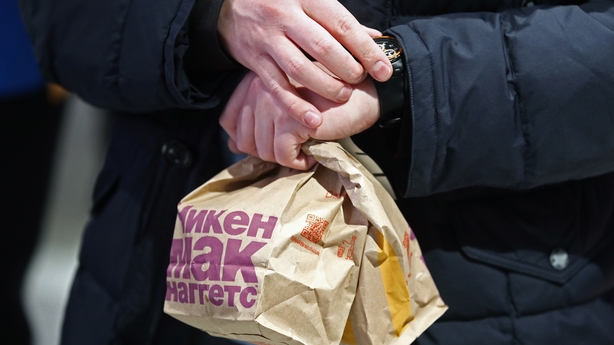McDonald's, PepsiCo, Coca-Cola and Starbucks have halted sales of their best-known products in Russia.
Pepsi and McDonald's were corporate pioneers whose work with the Soviet Union and the post-Soviet Russian state decades ago were seen as improving international relations.
All four companies have major operations in Russia.
McDonald's said it would go on paying salaries to its 62,000 employees in Russia as it closed 847 restaurants.
The first location to open in Russia, in central Moscow's Pushkin Square in 1990, became a symbol of flourishing American capitalism as the Soviet Union fell.
"I'm glad they came around and made the right decision," Jeffrey Sonnenfeld, a professor at the Yale School of Management who is tracking major companies’ stances on Russia, said after the move by McDonald's.
"It’s a really important impact and it's symbolic as much as it is substantive."
Starbucks Corp is temporarily closing hundreds of stores.
The company said that its partner, Alshaya Group, which operates at least 100 cafes in Russia, will "provide support to nearly 2,000 partners in Russia who depend on Starbucks for their livelihood".
Pepsi Co Inc will suspend all advertising in Russia and stop the sale of its drinks brands, while continuing to sell essentials such as milk and baby food.
Rival Coca-Cola Co said it will suspend its business there.
Coca-Cola was the official drink of the 1980 Olympic Games in Moscow, despite the United States boycotting the event in protest of the Soviet invasion of Afghanistan.
Scores of other companies also have rebuked Russia, and Amazon.com Inc said it would stop accepting new customers for its cloud services in Russia and Ukraine.
Universal Music suspended all operations in Russia and online dating service Bumble Inc will remove its apps from stores in Russia and Belarus.
Earlier, Royal Dutch Shell Plc stopped buying oil from Russia and said it would cut links to the country entirely while the United States stepped up its campaign to punish Moscow by banning Russian oil and energy imports.
Moscow has termed the attack a "special military operation" aimed not at occupying territory but at destroying Ukraine's military capabilities.
McDonald's opened in Pushkin Square 32 years ago as the Soviet Union was collapsing.

That new restaurant represented the thawing Cold War tensions at a time when some young Russians were desperate to get their hands on blue jeans and other Americana.
"It's impossible to predict when we might be able to reopen our restaurants in Russia," McDonald's CEO Chris Kempczinski said in a note emailed company wide and posted on the company's website.
"We are experiencing disruptions to our supply chain along with other operational impacts. We will also closely monitor the humanitarian situation."
Paul Musgrave, a University of Massachusetts political science professor, said the McDonald's closures show how the quick and broad imposition of Western sanctions on Russia will have a lasting economic impact.
He also said the decision puts to rest the theory that business ties will inevitably lead to closer US-Russian relations.
"It's the spiritual end to any hope that commercial ties by themselves would sustain political integration."

